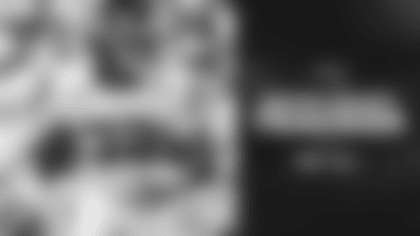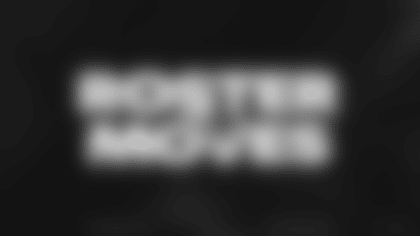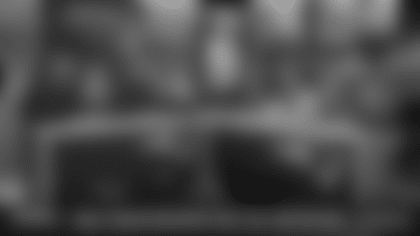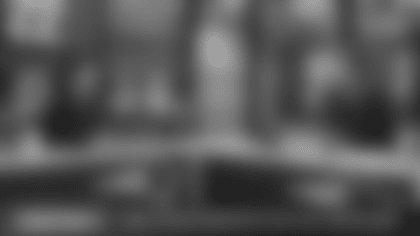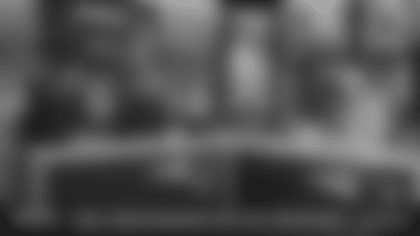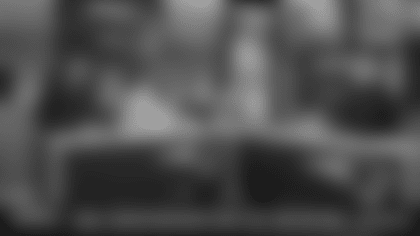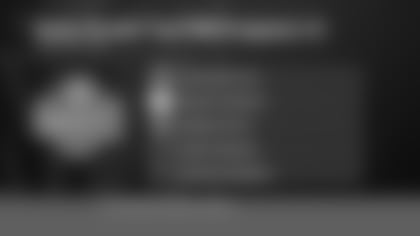[

]()
BB: Today is like a regular Thursday kind of practice for us. We are going to really try put some emphasis on the passing game. I didn't think we threw the ball or executed very well last week. We had a bunch of scramble plays and all of that. We really just didn't go back and throw it and catch it and complete it like we needed to, or protect it. All of those things, hopefully we can get some improvement there and that will be the emphasis for today. Then on Friday, it will be kind of a review thing tomorrow, even though it is Thursday, it is a Friday for us and then be ready to go. We will take a look at things after practice and get teed up for how we want to rotate the players and that type of thing going into the game, although that is always subject to change depending on how the game goes. It was good to see a couple of more guys back out there yesterday. Hopefully they will be back today. Our numbers are increasing a little bit so that is good. We had the Quinn Dorsey trade and the Joel Jacobs signing. I think we are up to speed.
Q: Can you talk about what you look for in an NFL quarterback, maybe some of the qualities that you may not see in a college quarterback?
BB: Well, I think the first thing is production. The second thing is accuracy. The third thing would be a combination of intelligence, game management, and decision-making. It could be separated but it all kind of comes back to a little bit of the same thing, the game from the neck up.
Q: As defensive players get faster, is there any one particular area that you look at?
BB: With the quarterbacks?
Q: Yes.
BB: Well, I think they are all interrelated. Again, you could be good in two of those areas and not good in the third area, and you are probably not going to have much. At some point, for a good NFL quarterback, those are going to have to be above average for the guy to really, I think, be successful. You can't be a good quarterback without production or without accuracy or without some degree of decision-making/game management, field recognition and presence, however you want to define those terms, there is some relationship there.
Q: One of the typical quarterback stereotypes to describe a good quarterback is 'He can make all of his throws.' I imagine that would have to do with arm strength. Is that a component of accuracy?
BB: I don't think it is a component of accuracy. There is certainly a minimum or level of arm strength that a quarterback would have to have. I can know all of the coverages and I go out there and not be able to complete a pass. That is not really what it is about. I think that the arm strength is a little bit overrated because there are only but so many throws that require maximum arm strength and you see an awful lot of quarterbacks in the league that complete a lot of passes, but I would say their arm strength is average. There have been a lot of great ones through the years. The Billy Kilmer's of the world and the Fran Tarkenton's of the world and the guys like that who were great quarterbacks but they were going to throw the ball through any wall, but they completed a lot of passes for a lot of yards and their offenses score a lot of points. I think that is a little bit overrated. All other things being equal, if the quarterbacks had all of the other components and then had a strong arm, then that is going to allow them to make a few throws that a guy without that type of arm strength and velocity might not make. Assuming that the accuracy is the same.
Q: Can you talk about all of the areas that Tom [Brady's] skills have improved since he has taken over?
BB: All of which areas? Why don't you give them to me, and I will talk about them?
Q: His accuracy.
BB: The accuracy, I think that Tom's throwing mechanics have improved significantly since 2000, not to the same degree because the rate of improvement wasn't the same, but they have continued to improve even from the 2001 season. I think that he has good accuracy. A lot of that accuracy also is combined with good decision-making where if you throw the ball to a more open space, there is a little bit more margin for error than if you throw the ball into a really tight space. You really have to thread the needle there. I think his accuracy is better, it has improved and I think that it is good. I think it was okay as a rookie. I don't think it was great. It was okay.
Q: Can you talk a little bit about the performance in training camp and the first preseason game for Chas Gessner and Scott Farley?
BB: I think both Chas and Scott helped themselves. I think that they both played with a higher level of confidence and probably that was a result of playing the games this spring in Europe for Berlin. They played physically. They played with confidence. They played aggressively. Neither one of them really had a chance to play at all last year. We saw them in some practices and that kind of thing, but that was it. It was good to see them in game conditions. I think they both helped themselves. They both gave a good account of themselves both in the kicking game and on offense in Chas' case and on defense in Scott's case. But where they really helped themselves is on special teams making tackles, pressuring the punter, doing those kind of things and that was good for them. They will get more opportunity to do it this week. Hopefully they can keep stepping up to that level of physical, aggressive play and be productive in the kicking game, number one, and then carry that over onto their side of the ball.
Q: Regarding stopping the run in years past and playing in a 4-3 versus a 3-4 and with the absence of Ted Washington, I am trying to figure out, how do we know what we are going to get when the personnel doesn't change much and the scheme doesn't change much?
BB: Well, I think that the media and the public make a lot bigger deal about the 4-3 and the 3-4 than we see it. We see those as both of them being part of our system, being the same for a lot of people, just a little bit different on the inside there depending on how it is configured even though it might be a little bit different in the scheme, the techniques are the same and there is a lot of carryover between the two systems. It comes down to some choices that you make, whether it be with personnel or a little bit of scheme or how you want to handle the inside running game or pass rush part of it. So that is really where it is. I don't see it as that big or that dramatic of a situation whether we play one or the other. Again, for a lot of players, if you weren't talking to the guy who was playing on the center, if you were talking to the safeties or the corners or the outside linebackers, it would have very little impact on them other than sometimes the verbiage is different. So what we would call one thing, in one front, it might be called something different just so we can differentiate between them because there is a difference in the inside part of the defense. All of the out of the perimeter things, coverage wise, a lot of those would play very much the same.
Q: Well, the personnel didn't change much from 2001 to 2002. Really only Washington was, to me, the only major change on the defensive line and he spent some time out. It was still kind of an up and down performance against the run, two peaks and one valley in 2002. Why, if the personnel wasn't changed?
BB: I think that going from '02 to '03 we really went back and reprioritized some of our defensive principles and our run principles and put a lot more emphasis and a lot more stress on them. Also, [we] placed players in the positions where we felt that they would strengths for those guys. I think that the system fit them. The strengths of the players were indeed, strengths and they played to them therefore our production was better. In 2002, some of the schemes might not have accentuated some of the strong points of the players even though it was the same players. Maybe we didn't coach as well. Maybe we didn't play it as well. All of that was definitely upgraded from the 2002 to the 2003 season on a lot of different levels. I don't think that it was any big one thing. It wasn't Ted Washington because, as you said, it was okay when he wasn't in there even though he was very good at it. I am not taking anything away from him. With him or without him, it was still pretty productive. There was more to it than just his addition, and he was a big part of it in more ways than one.
Q: What were some of the principles?
BB: Well, in a 3-4 defense, which we played extensively last year, and even when we didn't play the 3-4 and played a four-man line, we predominately had defensive linebackers at the end of the line of scrimmage, as opposed to a defensive lineman. That cleared up some run-force issues. It gave a much more consistent perimeter defense to us. So it was always a DB (defensive back), an outside linebacker and a defensive lineman, whereas the previous year we had had some different combinations where it could go DB and linebacker, or even in some cases, end, DB, linebacker. That can create some problems for the offense because the perimeter is not the same, but it probably ended up creating some problems for us defensively because we weren't as good at it, didn't execute it as well, and in some cases had some breakdowns where we just didn't have it. We thought we were here, but we didn't quite have it and there was some kind of miscommunication or something and the perimeter of the defense was just too soft. The last thing, which as I've said many times before, is in '02 we gave up a lot of big plays in the running game. There weren't very many last year, and the secondary is accountable for that. They are going to eventually block the nose. They are eventually going to block the middle linebacker, I don't care who it is. When they do that, the guy gains seven or eight yards if he's tackled in the secondary or he runs for 60 yards if he's not tackled. That's what a secondary's job is, collectively, to leverage the ball and prevent big plays. If there is a big play, they have to go through the secondary. There is no other way around it. You can't blame a 50-yard run on the nose. You can't blame it on him. The secondary has to be able to keep those in happening. When they happen then there is some kind of breakdown back there, so we obviously had a lot of those in the '02 season because we gave up a lot of big plays in the running game.
Q: How is Asante Samuel doing so far this season?
BB: Good. Asante, I think, has really come on strong recently. He missed a few days there at the beginning of camp, but he has come back strong. Kind of like he was last year, every practice he's knocking down a couple of balls, he's got his hands on them or intercepting them or knocking them down. He's been very active in practice. I thought he had a good start last week against the Eagles. Now that he's really into it and has been consistently out on the field, he has shown up on the ball a lot, and it's been good.
Q: Last year Asante Samuel was used a lot as the fifth defensive back. Do you see a bigger role for him this year?
BB: I think he's certainly competing for one. Again, it will all depend on how his playmaking stacks up against every one else's and his performance and consistency, not just in the passing game but also in the running game in terms of run force and open-field tackling, relative to some of the things we talked about there with Tom (Brady)'s question. I think he's certainly competing for it, absolutely.
Q: How nicely has Asante Samuel fit in with this team?
BB: He's been a good contributor for us. He really has. He's one of those guys that gets his hands on a lot of balls. Some defensive backs play a lot, and they might be close to it, they might make a lot of tackles, they might have some big hits, but they don't intercept or knock down very many passes. There are other guys that it just seems like the ball comes to them somehow. They are in the right place. They anticipate things well. They have good reactions and can get their hands to where the ball is being thrown. He seems like one of those guys.
Q: Could Asante Samuel be a starter right now, or is he a few years away from that?
BB: I don't know. I think he's competing for it with everybody else. We'll play the best guys.
Q: This year there seems to be more of a defined number one back in the offense (as opposed to Kevin Faulk and Antowain Smith splitting carries last year). Has that changed Kevin Faulk's role at all?
BB: I don't think any roles have been established. I don't know that they've changed because I don't know what they are.
Q: I think most people feel that the acquisition of Corey Dillon was intended to make him the number one back.
BB: This number one, number two (running back) thing is a lot bigger to you than it is to me. Let me put it this way, I think that we're going to have, and I hope that we're going to have, good production from that position. That's my expectation. How exactly that will come and where it will form, I don't know at this point. I'm not going to sit here and say, 'This guy is going to get the ball that many times, and somebody else is going to get it this many times and this is how many yards we want from this guy or that guy.' I don't know. That could vary from game to game, and it will depend a little bit on the players' performances. I think we have good depth at the position. I don't feel badly if any of those guys has the ball in their hands, and we'll just see how that works itself out. Kevin (Faulk) last year touched the ball, I think including the passing game, he actually touched the ball more than Antowain (Smith) did. The carries, the running carries, were very close. It wasn't that way the year before or the year before that. This year maybe it will be that way, maybe it won't. We'll do what we think is best and try to attack the defense the best way we can. If that's throwing it, if it's running it, if it's handing it to one guy or another guy, that will all take care of itself as we put together the game plans and the people are available to play.
Q: Can you assess Kevin Faulk's camp so far?
BB: I think Kevin has had a good camp. I think Kevin has really been a consistent player for us the last couple of years. I think that was something that he has improved on. He's been a really consistent player. He sees holes well. He has really good vision and runs the ball well. He's always been strong in the passing game but has continued to improve in that area. His blitz pickup has improved, and that's pretty solid. He's a factor for us in the kicking game as a returner. I think that he's been very consistent, makes very few mental mistakes, is a smart guy that anticipates things well. A lot of times he helps somebody else out who is wrong on a formation or something like that. He sees it, can correct it, and can help show some leadership and give some direction back there. I'm really glad we have Kevin. He was a guy that we re-signed this year in the offseason. I'm glad we have him. I think he's going to be a really good contributor for us. He has a lot of versatility. His contributions could come in a lot of different fashions. I'm sure they will.
Q: At this point does it look like Benjamin Watson will be able to play on Saturday?
BB: We'll make that decision later on. I told him that he should prepare for that because I don't want him to think he's not going to play, and then we play him. So he'll prepare for it, and ultimately that will be our decision, coaching decision, as to whether we think he's ready to go or not. We want him to try to work toward that point. But I don't think we're there yet. If the game was tomorrow I would say no, but we have a couple more days. We'll see how it goes.
Q: Will it be a game-time decision?
BB: It could. In this case, it could go to pre-game warm-ups. We'll probably try to define it a little bit more the day before the game just from a coaching standpoint so we know how the substitutions are going to go and all that. He has a long way to go. He has a lot of catching up to do. I think we're making some progress, but Rome wasn't built in a day and neither was catching up in training camp.
Q: Is Cedric Cobbs getting closer to practicing?
BB: Cedric is doing a lot better. I think he's still not there yet, but he's doing a lot better. I think that what he needs to do is continue to work hard and not really worry about anybody else or anything else but just getting himself ready to go. That's what he's been doing, but that's what he needs to keep doing. At some point, I'm sure he will be ready. (He shouldn't) worry about the time frame because there is nothing he can do about that. The only time frame is when he's ready, then we'll put him in there. Until then, don't be frustrated, keep working hard, and try to get ready.
Q: Have you detected that from him [frustration]?
BB: No, not at all, but you kind of asked what the approach was. That's kind of how we're approaching it, take it day by day, don't worry about next week, don't worry about three days from now. Let's get all we can out of today, see where we are, build on that tomorrow. I think that will do more for him than anything else. That's what we told him to do, and I think he's trying to do it.
Q: Did you see anything in the preseason game or in practice that has made you want to place an emphasis on the passing game?
BB: It wasn't any good. You were at the game, right? The only passes we completed were ones that we scrambled around on or broke a tackle in the pocket or some loose play where we got it out to somebody, scrambled out of the pocket and hit somebody after the protection broke down and after the coverage broke down. That's great. That's football, but at some point during the year you have to go back there, drop back, block them, throw it, and catch it. That's what the passing game is, it's not playing junior high schoolyard football running around, everybody going different directions, the defense misses a couple of tackles or something and they will lob it down there and somebody catches it. You can't win doing that in this league.
Q: On a whole, how does the team look on reading defenses?
BB: I would have hoped it would have been a lot better than it was against the Eagles. Hopefully it will be better this weekend against Cincinnati. That's everybody. That was from the first pass to the last one. We hit the fullback on a slant pattern in the third quarter. We hit [Malaefou] Mackenzie on a slant pattern, and he hit the safety there. We dropped back. We caught the ball. We threw it, he caught it, kind of like what is supposed to happen in the passing game. But take a look at all the rest of the plays and we're ducking, running around, throwing it here, throwing it there, changing the route after we scrambled out. It looks like a junior high school passing game.
Q: Were the problems in the passing game with the quarterback?
BB: Quarterbacks? You have guys coming through the line of scrimmage unblocked. What do you want the quarterback to do? Then sometimes it is on the quarterback. We've got guys open and can't hit them. Sometimes it's on the receivers running bad routes. It's a combination of things, but I'm just saying at some point in a game you think you'd be able to drop back, throw the ball, and catch it. You would think that would happen at this level at some point in the game, and it didn't very often. There are a lot of people that are involved in that whole process. It's not just the quarterback. It's not just the receivers. It's everybody.
Q: Does that cause you to place an emphasis on protection?
BB: There were breakdowns everywhere. We had breakdowns at every position, every position on the line, every other position on the field, too, the guys running the routes, the guys throwing the ball, the guys blocking. You guys were at the game. We converted four third downs, and most of them were on some kind of loose scramble plays that were pretty disorganized anyway. That's okay. It's okay to make plays on that. That's great, that's reactionary football. It's being instinctive and making the best of a bad situation, but you can't run a passing game like that





